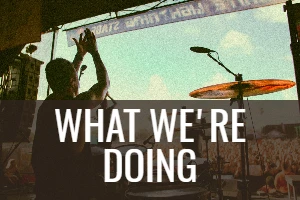On the second night of his four-day residency at Jazz Alley, bassist Marcus Miller wasted no time in reminding a packed house of his talent.
Heading a wonderfully dynamic quintet – Donald Hayes on sax, Russell Gunn on trumpet, Xavier Gordon on keys, and the exceptional Anwar Marshall on drums – Miller swept through a flurry of genres and deep-pocket grooves, some of them rubbing elbows in the same tune. Highlights included choice picks from his time with Miles Davis, Luther Vandross, and David Sanborn.

Miller grew up at the arguable epicenter of global jazz, 1960s Brooklyn, and internalized music via his father’s organ playing at the African Orthodox Episcopal Church. His father’s cousin, the jazz pianist Wynton Kelly, occasionally jammed in the church basement after services, foreshadowing Miller’s multiple stints with Miles.
Childhood ambitions on the clarinet were derailed because, in Miller’s words, the gigs were on bass. In a 2016 interview with NYU jazz historian David Schroeder, Miller depicts what amounts to a working man’s rise in the Big Apple, fielding calls around the clock from his booking agency. The more he played in New York, the more people wanted to hire him.
Miller stands at the forefront of crossover jazz artists, musicians who coaxed the genre from dinner club confines to ascendancy in hip hop, soul, and rock. Jazz music, according to Miller, is “inherently fusion.” Fusion in the sense that seemingly disparate artists use jazz as a vehicle for exchanging ideas (for more on this, see my recent article Decoding Jazz). Per Miller, a skilled artist uses the language of jazz to negotiate the pressures of their external musical environment. This stylistic assimilation helps to define one’s artistic legacy, as with Herbie Hancock’s “Rockit,” or Roy Hargrove’s “Strasbourg/St. Denis.”
Miller has maintained musical relevancy as well as anyone, but make no mistake: his touring quintet was very much a jazz band. Quoting “Night in Tunisia” at the end of “3 Deuces,” blowing the off-phrase “Giant Steps” theme in David Sanborn’s “Run for Cover,” Friday’s performance held numerous teasers. In “Mr. Pastorius,” a Miller-written song off Miles Davis’s Amandla, the band floated through an understated lead-in before double-timing 12-bar blues solos, swinging hard with Russell Gunn on a Harmon Muted trumpet. In “February,” from Miller’s outstanding Renaissance, the bandleader raked, slapped, and hammered his strings, flaunting world class chops.
Leon Timbo joined the band for two vocal ballads before the quintet returned to more improvisatory territory, rounding things out with “Tutu,” the title track from Miles’s 1986 tour de force.
For listeners looking for a foothold in Miller’s catalog, I recommend Renaissance. Jazz fans take note: 2023 accounts for an embarrassment of bass riches down at Dimitriou’s, including esperanza spalding in late January, Dave Holland a few weeks later, and Victor Wooten two months after that. Or keep up with Jazz Alley’s Event Calendar.
Discover more from Post Alley
Subscribe to get the latest posts sent to your email.
